
The Bolsheviks, led by Vladimir Lenin, were a radical faction of the Marxist Russian Social Democratic Labour Party (RSDLP) which split with the Mensheviks at the Second Party Congress in 1903. The Bolshevik party, formally established in 1912, seized power in Russia in the October Revolution of 1917, and was later renamed the Russian Communist Party, All-Union Communist Party, and ultimately the Communist Party of the Soviet Union. Its ideology, based on Leninist and later Marxist–Leninist principles, became known as Bolshevism.

The October Revolution, also known as the Great October Socialist Revolution, October coup, Bolshevik coup, or Bolshevik revolution, was the second of two revolutions in Russia in 1917. It was led by Vladimir Lenin's Bolsheviks as part of the broader Russian Revolution of 1917–1923. It began through an insurrection in Petrograd on 7 November 1917 [O.S. 25 October]. It was the precipitating event of the Russian Civil War. The initial stage of the October Revolution, which involved the assault on Petrograd, occurred largely without any casualties.
The ten years 1917–1927 saw a radical transformation of the Russian Empire into a socialist state, the Soviet Union. Soviet Russia covers 1917–1922 and Soviet Union covers the years 1922 to 1991. After the Russian Civil War (1917–1923), the Bolsheviks took control. They were dedicated to a version of Marxism developed by Vladimir Lenin. It promised the workers would rise, destroy capitalism, and create a socialist society under the leadership of the Communist Party of the Soviet Union. The awkward problem, regarding Marxist revolutionary theory, was the small proletariat, in an overwhelmingly peasant society with limited industry and a very small middle class. Following the February Revolution in 1917 that deposed Nicholas II of Russia, a short-lived provisional government gave way to Bolsheviks in the October Revolution. The Bolshevik Party was renamed the Russian Communist Party (RCP).

Maria Alexandrovna Spiridonova was a Narodnik-inspired Russian revolutionary. In 1906, as a novice member of a local combat group of the Tambov Socialists-Revolutionaries (SRs), she assassinated a security official. Her subsequent abuse by police earned her enormous popularity with the opponents of Tsarism throughout the empire and even abroad.
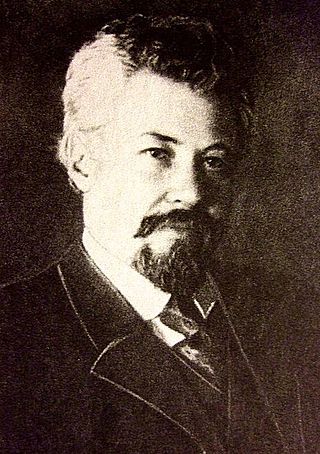
Elections to the Russian Constituent Assembly were held on 25 November 1917. Organized as a result of events in the February Revolution, the elections took place two months after they had been originally meant to occur. They are generally recognised as the first free elections in Russian history, though they did not produce a democratically elected government, as the Bolsheviks subsequently disbanded the Constituent Assembly and proceeded to rule the country as a one-party state with all opposition parties banned.

The All-Russian Central Executive Committee was a permanent body formed by the First All-Russian Congress of Soviets of Workers' and Soldiers' Deputies, then became the supreme governing body of the Russian Soviet Federative Socialist Republic in between sessions of the All-Russian Congress of Soviets from 1917 to 1937. In 1937, the All-Russian Central Executive Committee was replaced with the Presidium of the Supreme Soviet of the Russian SFSR.

The Left SR uprising, or Left SR revolt, was a rebellion against the Bolsheviks by the Left Socialist Revolutionary Party in Moscow, Soviet Russia, on 6–7 July 1918. It was one of a number of left-wing uprisings against the Bolsheviks that took place during the Russian Civil War.

Matvei Konstantinovich Muranov was a Ukrainian Bolshevik revolutionary, Soviet politician and statesman.
Ukrainian Socialist-Revolutionary Party was a political party in Ukraine and the Russian Republic founded in April 1917, based on separate groups and circles of SRs that existed on the territory of Ukraine since 1905. The left faction of the party dissolved it in 1918 forming a new party, while the Ukrainian Socialist-Revolutionary Party was recreated in January 1919 by its moderate faction members.

Andrei Lukic Kolegayev was a Left Socialist-Revolutionary and later Soviet statesman who advocated an alliance with the Bolsheviks.

The All-Russian Congress of Soviets evolved from 1917 to become the supreme governing body of the Russian Soviet Federative Socialist Republic from 1918 until 1936, effectively. The 1918 Constitution of the Russian SFSR mandated that Congress shall convene at least twice a year, with the duties of defining the principles of the Soviet Constitution and ratifying peace treaties. The October Revolution ousted the provisional government of 1917, making the Congress of Soviets the sole, and supreme governing body. This Congress was not the same as the Congress of Soviets of the Soviet Union which governed the whole Soviet Union after its creation in 1922.
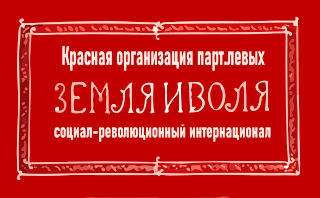
The Party of Left Socialist-Revolutionaries-Internationalists was a revolutionary socialist political party formed during the Russian Revolution.
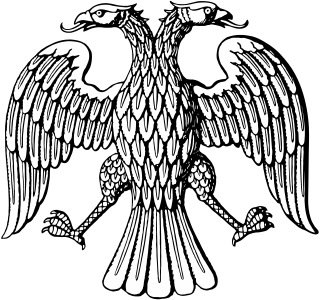
The All Russian Constituent Assembly was a constituent assembly convened in Russia after the February Revolution of 1917. It met for 13 hours, from 4 p.m. to 5 a.m., 18–19 January [O.S. 5–6 January] 1918, whereupon it was dissolved by the Bolshevik-led All-Russian Central Executive Committee, proclaiming the Third All-Russian Congress of Soviets the new governing body of Russia.

The Party of Socialist-Revolutionaries, also known as the Socialist Revolutionary Party, was a major political party in the late Russian Empire, during both phases of the Russian Revolution, and in early Soviet Russia.
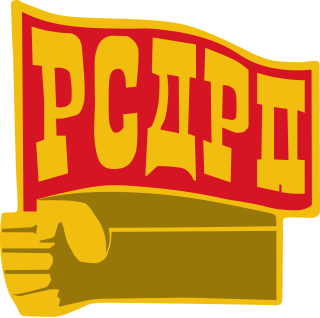
The Russian Social Democratic Labour Party (RSDLP), also known as the Russian Social Democratic Workers' Party (RSDWP) or as the Russian Social Democratic Party (RSDP), was a socialist political party founded in 1898 in Minsk.
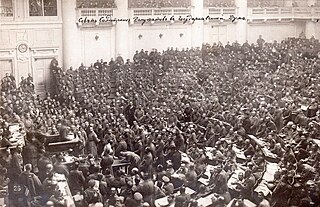
The Petrograd Soviet of Workers' and Soldiers' Deputies was a city council of Petrograd, the capital of Russia at the time. For brevity, it is usually called the Petrograd Soviet.

The Second All-Russian Congress of Soviets of Workers' and Soldiers' Deputies was held on November 7–9, 1917, in Smolny, Petrograd. It was convened under the pressure of the Bolsheviks on the All-Russian Central Executive Committee of the First Congress of Soviets of Workers' and Soldiers' Deputies.

Prosh Perchevich Proshian was an Armenian revolutionary active in the Left Socialist Revolutionary Party.

The Third All-Russian Congress of Workers' and Soldiers' Deputies' Soviets took place on 23-31 January 1918 [O.S. 10-18 January 1918] in Tauride Palace, Petrograd. It was the successor to the Second All-Russian Congress of Workers' and Soldiers' Deputies' Soviets.
The Third All-Russia Congress of Soviets of Peasants’ Deputies was held at the Smolny Institute, Petrograd on 26 January 1918 [O.S. 13 January 1918]. The Socialist Revolutionary Party (SRs) wanted to keep the Congress Peasants' Deputies separate from that of the Congress of Workers’ and Soldiers’ Deputies which was being run concurrently at the Tauride Palace, also in Petrograd. However, during the first session, the Bolshevik, Yakov Sverdlov, the Chairman of the All-Russian Central Executive Committee proposed a motion for the Congress to merge with that of the Third All-Russian Congress of Soviets of Workers’ and Soldiers’ Deputies. Despite opposition from the SRs and the Mensheviks, the motion was passed with the support Bolsheviks and the Left Socialist Revolutionaries, thereby transforming the two congresses into the Third All-Russian Congress of Workers', Soldiers' and Peasants Deputies' Soviets.
















